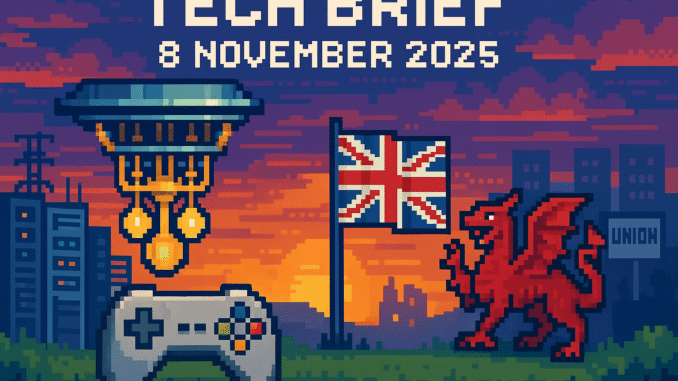
Tech Brief 8 November 2025 is all about momentum. British tech is getting another major government cash injection, Wales pushes onto the map with deliberate indie spirit, and today’s game studios are fighting old battles with new tools. The calendar also marks one of science’s quiet revolutions over a battered Crookes tube. No need for a tidy theme when so much is in motion.
Missed yesterday’s Tech Brief? Catch up here before diving in.
Quantum Computing Funding Puts UK Back in the Global Race
The UK government has rolled out a bold £670 million commitment to quantum computing, positioning Britain as a heavyweight in the global tech race. After years of talk about silicon giants and faded tech leadership, this pledge is a direct line to the nation’s home-grown legacy: Acorn, Sinclair, ARM, and now, research labs that hum with promise rather than nostalgia.
Why does quantum matter? This radical branch of computing uses qubits, which can exist in multiple states at once, not just 1s and 0s. The potential is enormous. Calculations that make even today’s supercomputers look clunky. Researchers, start-ups, and universities are in the mix, blending public funding with a streak of good old British stubbornness.
This is not just an investment in hardware. It is a signal that tinkering, building, and audacious invention are still central to the national tech story.
Wales Tech Week Showcases Homegrown Digital Pioneers
A simple fact: Wales Technology Week 2025 has pushed regional British tech stories into the spotlight. Against the backdrop of London-centric headlines, Welsh firms are showing grit and invention that recalls the indie energy of 80s coding clubs and local user groups.
This year, the Welsh tech ecosystem stood tall, highlighting cyber security, green computing, and gaming. Local talent is getting the attention it deserves, often with fewer resources, more imaginative hacks, and a strong sense of regional pride. The “scene” energy is not nostalgia here, it is reality. Companies are hiring, communities are growing, and digital projects have an edge.
It is hard to ignore how threads of early scene culture, such as zine chatter, basement repairs, regional stubbornness, still shape how innovation happens outside the M25. What happens if every forgotten corner goes digital at once?
Blackpool Bids for Datacentre, Aims for AI Growth Zone Glory
“Did you ever picture Blackpool as a future digital powerbase?” Not many did. But Blackpool Council is pushing to make the town a centre for tech-focused regeneration, including a new datacentre and a bid to become an official UK government AI growth zone.
This move could mean new jobs, modern infrastructure, and a genuine reboot for a patch of coastal Britain shaped by post-industrial decline. The bid may sound corporate on paper, but for those who recall foggy walks between smoky seaside arcades and old school LAN parties, it is more like a homecoming for British resilience. Strong datacentres are the core of internet reliability. Think warehouses of servers, not just a “cloud” in the sky.
As highlighted above, real innovation is not just for Oxford and Cambridge. Towns like Blackpool are ready for their moment, even if it is bundled with a stick of rock and a side of nostalgia.
UK Game Workers’ Union Faces Off with Rockstar Games
Rockstar Games, creators of the Grand Theft Auto series, have been accused by the Independent Workers’ Union of Great Britain (IWGB) of sacking employees for trying to unionise. More than 30 UK-based staff were reportedly fired for their organising activity, setting up a high-stakes clash over labour rights in the games industry.
While the industry has outgrown attic bedrooms and hand-lettered code, the fight for fair pay, safe hours, and worker solidarity is anything but retro. If anything, it is proof that the DIY, rebellious spirit of 90s game culture is alive, simply wearing different clothes and fighting on a grander stage.
This dispute feels connected to the wider reality explored above. Today’s tech scenes are still built by people who care, organise, and challenge power. Is the spirit of “bedroom coders” gone, or just reimagined?
From the Wayback Machine
On This Day: 1895 – Wilhelm Röntgen Discovers X-Rays
German physicist Wilhelm Röntgen was experimenting with a Crookes Hittorf tube when he noticed invisible rays could pass through cardboard and make a fluorescent screen glow. Within weeks, the bones of his wife’s hand were immortalised on glass plate, launching the science of radiology overnight. Today, X-rays are essential for diagnosis and industry. Röntgen’s careful method, curiosity, and improvisation remind us the biggest leaps often start with a single unexpected glow.
Today’s Big Question
Here is what is on my mind. Tech Brief 8 November 2025 is full of stories about place, power, and the people who keep building, whether it is quantum labs, seaside datacentres, or union halls in a game studio. What hidden strengths are sitting dormant in your community, waiting for the right push? Sometimes it just takes one bright idea.
Stay curious, stay kind, and check under the case before you power up anything from the ’80s. You never know what might spark.
Missed yesterday’s Tech Brief? Catch up here

Leave a Reply